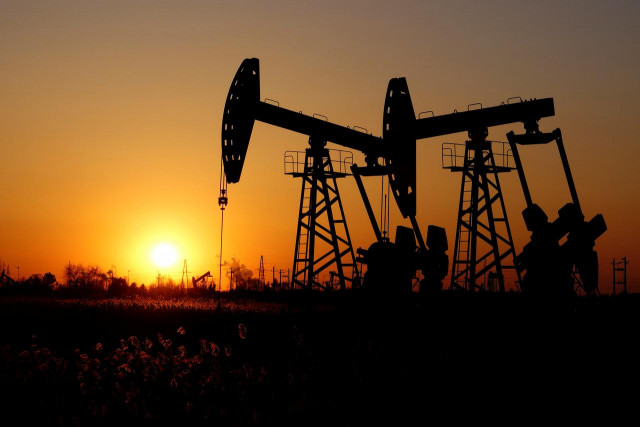PTI govt to install oil stock tracking system
Changes oil price revision formula without approval from relevant forum

PHOTO: REUTERS
Petroleum prices are linked with import prices of Pakistan State Oil (PSO) cargoes. However, the government has changed the oil pricing formula without approval from the competent forum. Secondly, the government has been following the monthly oil price revision mechanism with approval of the competent forum. However, this time petroleum prices have been increased before the end of month.
The Petroleum Division had been earlier trying to switch to fortnightly oil price reviews instead of monthly revisions. In that regard, it had sent a summary to the Economic Coordination Committee, which was not approved.
Special Assistant to Prime Minister (SAPM) on Petroleum Nadeem Babar said at a press conference that petroleum prices had been increased for 35 days. He said the government raised prices on June 26 as it would have to increase the price of petrol by Rs32 per litre on July 1. He, however, said oil companies would suffer losses in July.
The summary for petroleum price revision has always been routed through the Oil and Gas Regulatory Authority (Ogra). PSO forwards its import prices to the regulator, which verifies the statistics and then sends a summary to the Petroleum Division.
This time, the Finance Division prepared a summary and sent to the Petroleum Division, which was contrary to the set mechanism.
Now, the question is whether these figures had been verified by Ogra or not. The regulator also notifies the inland freight equalisation margin (IFEM), which is an important part of the oil pricing mechanism. A Petroleum Division spokesperson told The Express Tribune that prices were verified by Ogra on June 24 and reconciled with figures of the Petroleum Division, which were sent to the Ministry of Finance on June 25 with an update of the 25th day.
“On Friday, Ogra and the Petroleum Division again verified the figures before conveying prices to PSO and the oil industry. There was no violation but work was done expeditiously due to urgency in order to avoid dryout,” he added.
Federal Minister for Petroleum Omar Ayub on Saturday said the government was working to install an online tracking system to monitor sales and stocks of OMCs to check hoarding. He said the system would be managed by Ogra.
He said sales of petrol increased 92% in the first 10 days of June despite the lockdown and movement was slow, adding that there were 500 illegal licences of retail outlets and the government was going to take action against them.
He said the government had asked OMCs to provide a list of their licensed retail outlets and illegal pumps would be closed. The minister said petrol prices rose a sharp 112% but the government gave relief to the public by only raising the price by 25%. Addressing the press conference with the SAPM on petroleum, he said petroleum prices in Pakistan were the lowest in Asia.
The energy minister said on PM’s directive, the duration for petrol price revision has now been set at 35 days. “We are fighting with the mafia and hoarders,” he remarked. Meanwhile, Babar said before February 28, the price of petrol was Rs116.60 per litre. In May, PSO bought petrol at $21 a barrel, but in June that rose to $44.
Increase in taxes
Experts call it an unwise decision, which will spark a backlash. They say the government should have staggered the impact as it had a big room in the petroleum development levy for adjustment. At present, the government is charging Rs30 per litre each in petroleum development levy on petrol and high-speed diesel, which is at the highest level.
However, the government did not touch the levy and reduced the import price of petrol and diesel, which the oil industry says will add to its miseries. At present, the government is charging Rs44.5 per litre in taxes on petrol, which includes petroleum levy of Rs30 per litre and general sales tax (GST) of Rs14.5 per litre.
Published in The Express Tribune, June 28th, 2020.
Like Business on Facebook, follow @TribuneBiz on Twitter to stay informed and join in the conversation.



















COMMENTS
Comments are moderated and generally will be posted if they are on-topic and not abusive.
For more information, please see our Comments FAQ